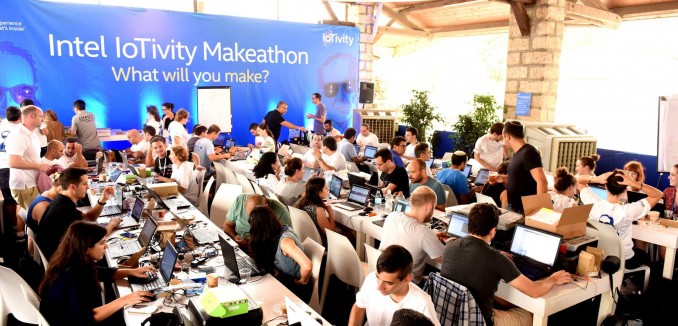Israel has earned a reputation as one of the world’s leading tech research and development hubs, and executives from Silicon Valley’s biggest firms have ideas why that is.
With a population just over 8.5 million, the Jewish state enjoys the highest density of startups and venture capital investment per capita in the world. Google, Facebook, Intel, and Microsoft are among more than 300 multinationals to open branches in Israel, and their executives told an audience at the DLD Tel Aviv Innovation Festival last month that the key to this success lies with the country’s local talent.
“My job at Google is to travel all over the world and talk to developers and startups and investors,” said Don Dodge, a developer advocate for Google. “I’ve been to every corner of the Earth. China, Japan, Australia, all of Europe, the Nordics, everywhere. There is no other country on Earth that thinks the same way that we [Google] do like Israel does.”
“Israel truly is the ‘Startup Nation.’ You think like us. You break things, you make things, you’re creative. It’s special,” he added.
Google first opened its Tel Aviv office in 2006, and now employs more than 600 Israeli engineers, who work on core products, including Search, Maps, and Live Results.
“There’s an amazing source of talent here,” Dodge said. “It’s about innovation, creativity, taking tremendous risks, understanding how to get to market. That’s what Israel does. It’s not about the cost.”
“We’ve made a lot of investments in companies in Israel and we’ve acquired five of them,” he noted. Google bought the Israeli navigation app Waze in 2013 for $1.3 billion, at the time the largest-ever deal for an app.
Eric Schmidt, executive chairman of Google’s parent company Alphabet, praised the diversity of Israel’s technology sector while visiting Google’s research and development center in Tel Aviv in June. “For a relatively small country, Israel has a super role in global technological innovation,” Schmidt said. “I can’t think of a place where you could see this diversity and the collection of initiatives aside from Silicon Valley. That is a pretty strong statement.”
Similarly, when Adi Soffer Teeni, the CEO of Facebook Israel, was asked what distinguished Israel as a tech hub, she pointed to the local talent. According to Teeni, Facebook’s engineering team in Israel was key to developing one of the social media network’s latest products.
“There’s amazing talent here. Multinationals come here with great R&D centers and recruit people with a very innovative way of thinking.”
She added that the culture in Facebook’s R&D facility in Israel, which opened three years ago, was similar to that of its Silicon Valley R&D facility, where workers “move fast and break things” while wearing “shorts and flip-flops.”
“Something is happening here in Israel,” she said. “There’s a magic and it’s not easy to explain what it is, but Israel’s a playground where it feels like home for the multinational.”
She also called on Israeli startups to stay ahead of competition in emerging tech hubs across Europe by focusing on maturing their companies.
Intel
Ray Ramon, managing director of Intel’s Ingenuity Partner Program, said his company was one of Israel’s biggest employers, with some 11,000 workers across the nation.
The microprocessing giant’s first Israeli branch, which opened in 1974, was also its first design and development hub outside of the United States.
Ramon spoke of Israeli “chutzpah,” which he called a useful tool that helps Israelis approach business ventures with boldness and confidence.
“The reason I started the startup program is because when you meet with a company in Israel, they come in and tell engineers that they’re doing it all wrong,” he said. “They push everything off the table. These engineers have been doing this for years. They’re world experts. And yet that startup is bold enough to come to a mammoth like Intel and say you’re doing it all wrong. This is one culture that you can’t get anywhere in the world.”
Intel’s main development center in Israel has been credited with some of the microprocessor giant’s most advanced products. Intel’s newest core processor chip, Kaby Lake, was built by the company’s team in Haifa. The center also produced the Sandy Bridge and Ivy Bridge processors, which power many computers currently in use.
Intel has produced and exported over one billion processors from Israel, including the 8088, which was the first processor developed for personal computers, and the Pentium MMX, which was the most popular processor in the 20th century.
Microsoft
Zack Weisfeld, the head of Microsoft Global Accelerators, said Microsoft’s R&D team in Israel swelled to nearly 1,000 people after 25 years in the country. “It’s the first R&D centre we opened anywhere in the world outside of Redmond,” he said.
He told Business Insider that a lot of “deep tech” was happening in Israel, with startups revolutionizing fields like artificial intelligence.
“Most of the founders we see [in Israel] come deeply from the tech world and don’t come from the business world trying to solve a problem and then finding a technical cofounder,” he said. “They really have a lot of IP [intellectual property] in the space and now they’re putting it to play in all categories: agriculture, robots, health.”
“There is something about the culture, and something about the market understanding and business understanding that might be a little more rough [among Israeli startups] at the beginning, but at the end of the day, and if you get them to the right place, they’re unstoppable,” he added.
In a February speech broadcast at Microsoft Israel’s annual Think Next event, Microsoft founder Bill Gates said that Israeli contributions to technology fields such as analytics and security are “improving the world.”
[Photo: DLD Tel Aviv Innovation Festival / Facebook]




